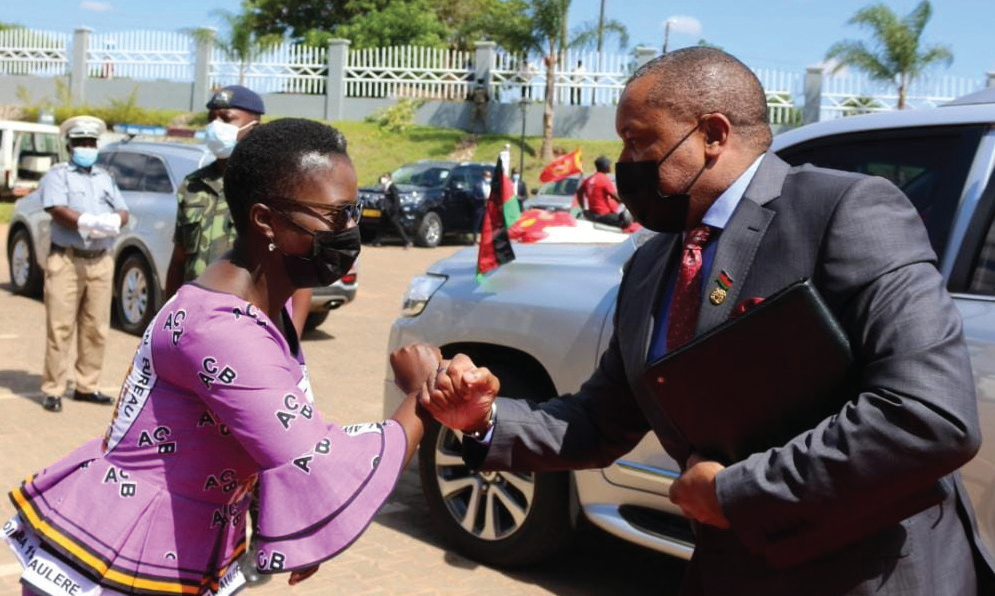Chizuma chides political parties
Anti-Corruption Bureau (ACB) director general Martha Chizuma has taken a swipe at political parties, both in opposition and government, over what she described as “their insatiable appetite for kickbacks”.
She said political parties are prone to corruption because that is their main means of funding their operations.

Chizuma said this on Thursday during the International Anti-Corruption Day commemoration in Mzuzu where Vice-President Saulos Chilima was guest of honour.
She noted that most political parties do not have financing strategies, as such, they seek kickbacks from contracts which perpetuates corruption in the country.
In July this year, the Malawi Law Society (MLS) kick started a process for parties to disclose their sources of funding.
MLS asked the Registrar of Political Parties to disclose sources and amounts of money four major political parties received between January 1 2019 and December 31 2020.
In a letter dated July 20 2021, the lawyers’ body demanded a report from the registrar on the state of the parties’ compliance under Political Parties Act, but no party has publicly declared its sources of funding to date.
Chizuma said the levels, intensity and sophistication of corruption continue to rise, threatening any meaningful development and aspirations of the country.
She said: “It is lack of integrity in almost all our governing political parties who, after almost three decades of multiparty democracy, have still not figured out legitimate ways of funding their parties.
“[They] have consistently sacrificed public services and goods meant for the people they are governing at the altar of questionable multi billion kwacha contracts to unscrupulous business people for kickbacks as a way of funding their parties to purchase party T-shirts and cloths as if that is all Malawians are entitled to. “
As part of solutions, the ACB chief said the bureau has undertaken to ensure that by March 2022, there would have been substantive progress in the incorporation of issues of integrity and ethics in the primary school curriculum as well as periodic lifestyle audits, among others.
Explained Chizuma: “Lifestyle audits and investigation of unexplained wealth would be in full operation within the bureau. Asset recovery would accompany any appropriate criminal investigations the bureau conducts.
“By then, we would have made efforts to convince the Judiciary that while waiting for the Financial Crimes Court, there should be an administrative arrangement where corruption and other financial crimes cases with a threshold of more than K1 billion involving politically exposed persons be assigned to a particular judicial officer and be dealt within a maximum period of six months.”
In his remarks, Chilima urged the ACB and other law enforcement agencies to deal with all the perpetrators of corruption and fraud without fear or favour.
The Vice-President said corruption has the power to rupture a country and its people beyond repair, but also it could make a government lose its legitimacy over its people.
Said Chilima: “This year’s commemoration is very relevant for Malawi especially at this time when the prevalence of this scourge is almost at an alarming rate with devastating effects on the economy of this country.
“I, therefore, call upon the Anti- Corruption Bureau and other law enforcement agencies to deal with all the perpetrators of corruption and fraud in Malawi without fear or favour.
He said corrupt elements are enemies of development so they must be dealt with decisively. Don’t be scared. You have the President’s and government’s full support on this,” said the Veep.
On his part, Minister of Justice Titus Mvalo emphasised the need for speed in addressing financial crimes-related cases, indicating that he was in support of the ACB’s proposal for an administrative arrangement within the judiciary.
Recently, ACB and the United Nations Development Programme (warned that the Malawi 2063 long-term development strategy risks failure if corruption continues to worsen in the country.





